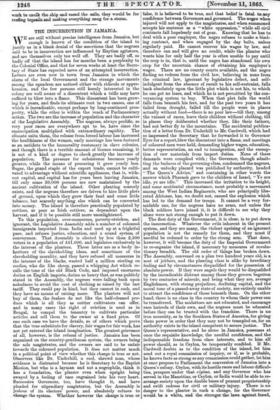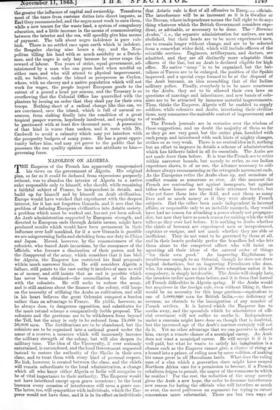THE INSURRECTION IN JAMAICA.
'UTE are still without precise intelligence from Jamaica, but Y V enough is known of the condition of the island to justify us in a blank denial of the assertions that the negroes said to be in insurrection are influenced by Hayti= agitators, and are themselves only too well off. They are badly off, so badly off that the island has for months been a perplexity to the Colonial Office, and that for seven weeks at least the Secre- tary of State has expected news of an attempted insurrection. Letters are even now in town from. Jamaica in which the alarm of the local Government and the strange movements among the squadron are noticed either with ridicule or appre- hension, and the few persons still keenly interested in the colony are well aware of a discontent which a trifle may have sufficed to blow into a flame. This discontent has been grow- ing for years, and finds its ultimate root in two causes, one of which is ineradicable, except perhaps by long-continued pros- perity, while the other is within the reach of Parliamentary action. The two are the increase of population and the character of the Legislative Assembly. The negroes, always prolific, as very poor races are everywhere apt to be, have since the emancipation multiplied with extraordinary rapidity. The climate suits them, the release from forced labour has increased the healthiness of the women, early marriage has been fostered as an antidote to the immorality customary in slave colonies, and though there is a terrible amount of licence remaining, it is not of a kind or degree to check greatly the increase of population. The pressure for subsistence becomes yearly greater, while the means of procuring it grow yearly less. Sugar, the grand staple of the export trade, cannot be culti- vated to advantage without scientific appliances, that is, with- out capital, and capital has for years been leaving Jamaica, till only some 30,000 persons are now maintained by the ancient cultivation of the island. Other planting scarcely exists, and the negroes therefore are driven, to hire little plots of gound, upon- which they grow their food and some little tobacco, but scarcely anything else which can be converted into money. The island is therefore practically populated by oottiers, as- poor as Irish cottiers, as dependent upon the harvest, and if it be possible still more unenlightened.
To this population, over-numerous, poverty-stricken, and ignorant, the Legislative Assembly adds a number of coloured immigrants- imported from India and used up at a frightful pace, and refuses justice, education, and a sound system of conveyance. That Assembly is elected by less than 2,500 voters in a population of 411,000, and legislates exclusively in the interest of the planters. These latter are as a body in-
heritors of the slaveholding ideas, and sometimes of the slaveholding morality, and they have refused all measures in the interest of the blacks, wasted half a million sterling on coolies, who die like sheep, passed a whipping Act which re- calls the tone of the old Black Code, and imposed enormous duties on English imports, duties so heavy that, as was publicly stated in the Assembly, the negroes were falling back upon nakedness to avoid the cost of clothing as raised by the last. tariff. They could pay in kind, but they cannot in cash, and they have no means of raising more. The planters will not buy of them, the dealers do not like the- half-cleaned pro- duce which is all they as oottier cultivators can offer, and in many cases the right of eviction is used as in Bengal, to compel the tenantry to cultivate particular articles and sell them to the owner at a. fixed price. Of one such case we have the details, as of others which prove that the true substitute for slavery, fair wages for fair work, has not yet entered the island imagination. The greatest grievance of all, however, is the refusal of justice. Jamaica has been organized on the country-gentleman system, the owners being the sole magistrates, and the owners are said to be unfair towards the coloured population. It does not matter much in a political point of view whether this charge is true or not. Observers like Dr. Underhill, a cool, shrewd man, whose evidence is distrusted because he is Secretary to the Baptist Mission, but who is a layman and not a negrophile, think it has a foundation, the planter even when upright being swayed by a feeling of race engrained into his very heart. Successive Governors, too, have thought it, and have pleaded for stipendiary magistrates, but the Assembly is jealous of its electors' power, and absolutely refuses to change the system. Whether however the charge is true or false, it is believed to be true, and that belief is fatal to any confidence between Governors and governed. The negro when injured will not apply to the magistrates, and when summoned accepts his sentence as a "white oppression," while all civil contracts fall hopelessly out of gear. Knowing that he has to deal with a poor employer, the negro refuses to make a bind- ing contract, and when engaged by the day bolts, unless regularly paid. He cannot recover his wages by law, and therefore can and will give no credit, while the planter who- wants him for only half the year is often unable to pay until the crop is in, that is, until the negro has abandoned his own crop for the uncertain chance of obtaining his employer's wages. There are no county courts available, and the negro. finding no redress from the civil law, believing in none from the criminal law, ignorant by legislative- defect, and self- indulgent from the absence of result to his self-restraint, falls back absolutely upon the little plot which is not his, to which he can get no lease, and which he is not permitted by the con- veyancing system to buy. When that plot fails the world falls from beneath his feet, and for the past two years it has failed from drought, failed till the people were in places actually without food—there is no poor law—till they, among the vainest of races, leave their children without clothing, till in places they deliberated whether they, like their fathers, had not better fly to the mountains. The accidental publica- tion of a letter from Dr. Underhill to Mr. Cardwell, which had so impressed the Secretary that he forwarded it to Governor Eyre for a report,blew the discontent into a flame, and meetings of coloured men were held, demanding higher wages, education, better representation, an end to immigration, and the exemp- tion of raw materials from import duties. None of these demands were complied with ; the Governor, though admit- ting the badness of the governing class, condemned the negroes, and an unlucky placard was published by authority, headed. " The Queen's Advice," and containing in other words the answer which Pharaoh gave to the children of Israel, "Ye are idle, ye are idle." This increased the irritation to its height, and some accidental circumstance, most probably a movement among the West Indian Regiments, who are principally libe- rated Africans, has, we doubt not, caused the explosion which has led to the demand for troops. It cannot be a very for- midable one, for the negroes have no arms, and unless the black soldiers have joined it, it is- difficult to see why. they alone were not strong enough to put it down. The first duty of the Government, it is clear, is to put down the insurrection. Whatever the evils inherent in the present system, and they are many, the violent uprising of an ignorant population is not the remedy for them, and they must if needful be reduced to order by the strong arm. That done, however, it will become the duty of the Imperial Government to re-organize the island, if necessary by measures of revolu- tionary breadth. The old order of things has broken. down. The Assembly, convened on a plan two hundred years old, is a nest of jobbers, and the planting class is alike by hereditary feeling and by circumstances disqualified for the possession of absolute power. If they were angels they would be disqualified by the ineradicable distrust among those they govern begotten by two centuries of misrule, and being what they are, average Englishmen, with strong prejudices, declining capital, and the- moral tone of a passed-away state of society, are entirely unable to attract the confidence of those beneath them. On the other hand, there is no class in the country to whom their power can be transferred. The mulattoes are not educated, and encourage race hatreds of their own, and the negroes must be educated before they can be trusted with the franchise. There is no- iron necessity, as in the Southern States of America, for giving them power in order that they may not be trampled on, for an authority exists in the island competent to secure justice. The Queen's representative, and he alone in Jamaica, possesses at once the requisite knowledge, the needful confidence, and the indispensable freedom from class interests, and to him all power should, as in Ceylon, be temporarily confided. If Mr. Cardwell doubts as to the condition of the island, let him send out a royal commission of inquiry, or if, as is probable, he knows facts as strong as any commission could gather, let him at once propose to Parliament the conversion of Jamaica into a Queen's colony. Ceylon, with its hostile races and labour difficul- ties, prospers under that regime, and any Governor who has served in the Mauritius, or Ceylon, or India would be able to re- arrange society upon the double bases of peasant proprietorship and swift redress for civil or military injury. There is no danger to the planter in such a change, for the Governor would- be a white, and the stronger the laws against fraud,. the greater the influence of capital and ownership. Transform most of the taxes from customs duties into direct imposts, as Earl Grey recommended, and the negro must work to earn them, while a new tenure for the waste land, a system of compulsory education, and a little increase in the means of communicating between the interior and the sea, will speedily give him means of payment. The talk about negro indolence is pure rub- bish. There is no settled race upon earth which is indolent, the Bengalee slaving nine hours a day, and the Nea- politan tilling his land with as much assiduity as a Dutch- man, and the negro is only lazy because he never reaps the reward of labour. Ten years of strict, equal government, ad- ministered by a man who can press hard when needful on either race, and who will attend to physical improvement, will, we believe, make the island as prosperous as Ceylon, where, with no slavery and a native population which will not work for wages, the people import European goods to the extent of a pound a head per annum, and the Treasury is so overflowing that the Colonial Office has quarrelled with the planters by issuing an order that they shall pay for their own troops. Nothing short of a radical change like this can, we are convinced, save the island, which is full of natural re- sources, from sinking finally into the condition of a great tropical pauper warren, hopelessly ingolvent, and requiring to be garrisoned with at least five thousand men. A possession of that kind is worse than useless, and it rests with Mr. Cardwell to avoid a calamity which may yet interfere with the prosperity budgets of many years. He has a great oppor- tunity before him, and may yet prove to the public that he possesses the one quality opinion does not attribute to him— governing force.































 Previous page
Previous page